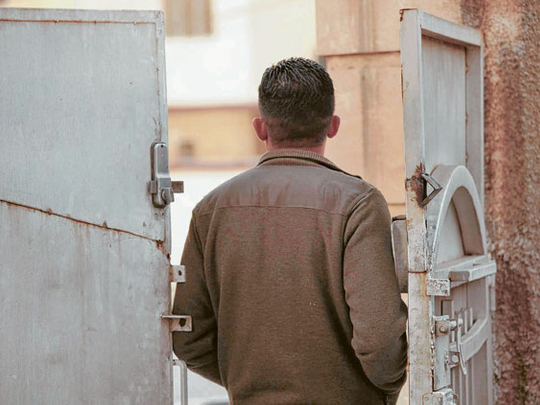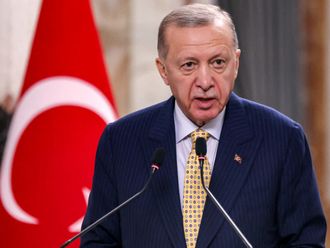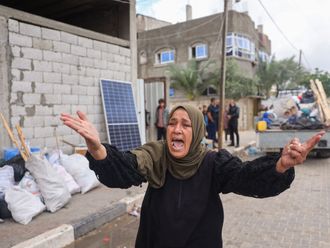
He rarely leaves his house. He has been shot at by gunmen in a passing car. He gets death threats over the phone. "Traitor," the callers say. "American agent." Tarek, 27, is a quick-witted, tech-savvy Iraqi who tosses off idiomatic American English phrases such as "I'm outta here" and "That's cool". When he served as an interpreter for the US military, Tarek lived on a secure base, safe from fellow Iraqis determined to kill him because of his service to America. But when the unit he served pulled out of Iraq on October 13, he was dismissed and escorted off the base.
The US government promised Tarek and thousands of other former interpreters that they would be first in line for special visas to the US, but with the pace of visa approvals having slowed to a crawl, that promise rings hollow for Tarek, who stays locked in his parents' home, working the phones and the internet to track his application.
For the first time since his work as an interpreter ended, Tarek left his home last month and drove through Baghdad to meet a reporter. He brought along his brother, a tall, burly fellow who literally watched Tarek's back with each step. Tarek asked that his surname not be published. "I served the Americans very well, but now they've left me on my own, with no security," he said in nearly flawless English. "They've expelled us all from the only places in Iraq that were safe for us — US bases."
Slow and cumbersome process
The visa process, always slow and cumbersome, has bogged down further since two Iraqi refugees were arrested in Kentucky in May 2010 on federal terrorism charges that included providing material support in the US for Al Qaida. With empty hours to fill each day, Tarek has become an expert on US immigration policy towards Iraq. He can quote legislation and recite testimony from congressional hearings and obscure federal documents. Three words from US legislation are imprinted on his brain — "special immigrant visa".
The Refugee Crisis in Iraq Act, passed in 2008, provided fast-track status for Iraqis who had worked for the US government or military. The law authorised 5,000 special visas per year — 20,000 through 2011. But through October, just 3,415 had been issued to Iraqis, according to the Iraqi Refugee Assistance Project. The State Department says 7,362 Iraqis who worked for the US have received special visas over that period, but that total includes family members. Through July, 62,500 Iraqis had applied through the special visa programme, though many have given up and dropped out. Applicants have been told to expect waits of at least eight months. Tarek applied two years ago, then filed an amended application in October 2010.
A US Embassy official in Baghdad, speaking on condition that he not be identified, acknowledged "unfortunate delays" in issuing special visas, the result of enhanced security clearance procedures, some instituted after the Kentucky arrests. But he said recent changes would speed the process. The State Department's National Visa Centre has been ordered to flag special visa applications for expedited action, the official said.
In the meantime, thousands of former interpreters have been cast adrift, threatened by insurgents as they wait for the federal bureaucracy to act. Interpreters provided vital support to American forces, offering valuable insights into Iraqi customs and tribal rivalries. They accompanied US troops on combat patrols, braving the same roadside bombs and insurgent attacks. Many were killed in combat or executed after leaving their military jobs.
Qasaim, 42, who served as a US military interpreter for seven years, quit in May to deal with a family crisis: His 15-year-old daughter had been kidnapped by her middle-aged teacher and forced to marry him. When he contacted the US Embassy about a visa application for his family, he said, he was instructed to bring his daughter in for an interview. "I said: ‘How can you ask me such a question? I don't even know where my daughter is,'" he recalled.
Waiting his turn
Qasaim said threats have been made against him, his wife and seven children. His extended family is also marked for death; two of his brothers worked for the US military and are seeking visas. The US Embassy finally agreed to forgo his daughter's interview and remove her from the family's application, Qasaim said. But consular officers will not say when or if the family will be able to immigrate to the US. "All the embassy can tell me is that we have to wait our turn," Qasaim said.
Major General Jeffrey Buchanan, the top spokesman for US forces in Iraq, said he sympathises with former interpreters who face death threats, and has tried to help a few obtain visas. "If they want to come to the US, we should do all we can to help them," he said.
During his recent brief excursion out of his house, Tarek was guarded and edgy. His brother hovered at his shoulder, tensing at each passing car or pedestrian. At his home, he feels like a prisoner. He watches American films and TV shows, which he once used as a means of honing his English skills. To kill time, he tends a tiny garden of tomatoes, herbs and flowers. He stays in touch with his fiancée. She lives in California with her mother, who once worked for the US military in Iraq and eventually received a visa. He calls the US consular office regularly, only to be told that his application remains on "administrative hold".
He posts queries to a chat room on the US Embassy's Facebook page. In one query, he asked: Is there light at the end of the tunnel for me? The answer from the consular office suggested that if Tarek was unhappy with the process and wanted his application returned to him, the embassy would be glad to oblige. Tarek let out a sharp laugh. "I guess I got my answer," he said.











